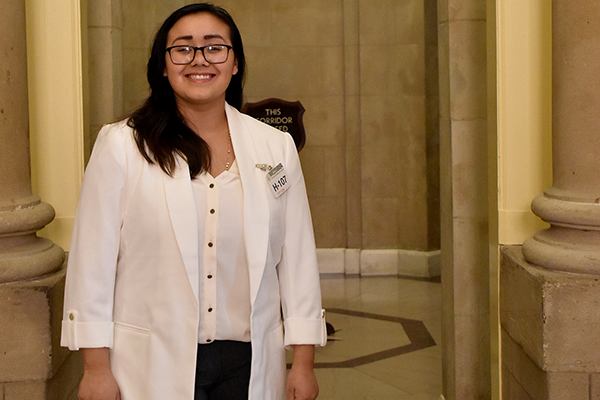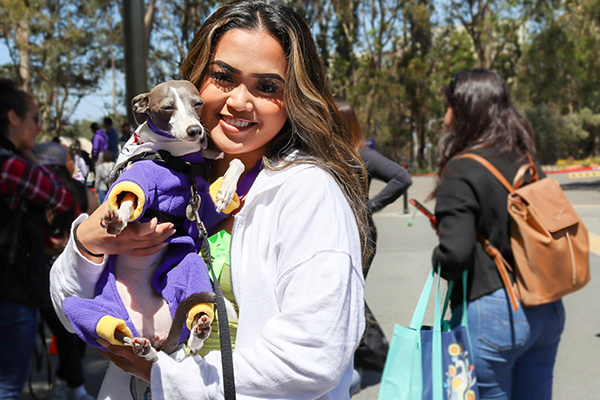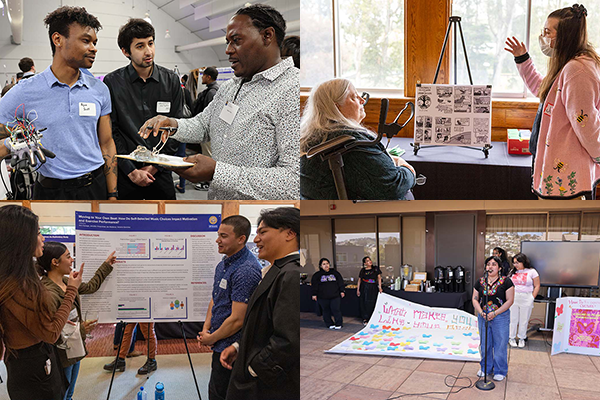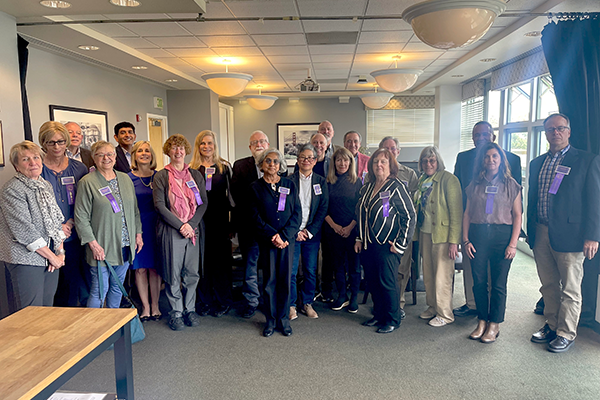News and Announcements

For children, being allowed to walk to a playground or to school by themselves is an exciting achievement — a sign they’re becoming “big kids.” Developmental scientists agree: They say such moments are critical milestones in a child’s development. Yet there are many child neglect laws in the United States that conflict with research about childhood and may actually interfere with development.
A new Social Policy Report paper by SF State Child & Adolescent Development Assistant Professor Rachel Flynn and collaborators explores this conflict and asks at what age can a child perform tasks without adult supervision. The answer is tricky, the authors explain, but reducing the answer to an age range (usually in preteens to early teens) can have serious consequences. It can lead to parents and guardians being unfairly prosecuted and be harmful for families and children. To complicate matters more, broad child neglect laws dramatically vary across the nation.
“I like to think [the laws are] well-intentioned and meant to keep kids safe. But the fact that there are places in the country where it is illegal for a child to be alone at 10 or 12 or babysit for their younger siblings … most developmental [scientists] would never guess that,” Flynn said.
These child neglect laws often do not align with developmental science research, the authors explain. Previous research in the United States and internationally suggest children undergo a shift to taking on more responsibilities around 5 to 7 years. To participate in independent activities, children need to reach developmental milestones in physical, cognitive and social abilities, and most children achieve these skills by 6 or 7 through experiences. A child’s ability to achieve these milestones are also dependent on many factors, so guidelines based on age alone without context are not effective.
“I think the other really big thing is remembering to keep this in the social justice lens … ,” Flynn said. “We’re really trying to drive home the idea that these child neglect laws can impact anyone anywhere, but children of color are particularly impacted … They’re more likely to have touch points with child protective services than white children as a result.”
Well-meaning but misplaced reports of child neglect due to lack of supervision can strain child protective systems that are intended to protect children. Flynn hopes everyone — policymakers, developmental science researchers, grade-school educators, pediatricians, parents and social work hotline moderators — look at the research paper’s recommendations to begin mitigating the negative impacts of some laws.
“Hotlines were meant to help children,” Flynn said. “They’re not helpful when every person calls because of every situation that they personally disagree with, for example a child walking their dog around the block alone. That clogs up resources and keeps the true neglect and abuse cases from getting the attention.”
Flynn was surprised to see the lack of developmental research on this topic but attributes this to a lack of awareness. There are psychologists, educational researchers and health researchers doing relevant research, but they don’t all talk together.
While her own research usually focuses on the media’s impact on children and how it affects play, Flynn plans to take the lessons of her recent paper into her advocacy work. She has already talked to some policy makers and hopes to help educate hotline workers and others
“The question always is what age can kids be unsupervised? There’s no straightforward answer. It’s rooted in individual differences in context and cultures and variations,” Flynn said. “But we can provide some guidelines to really say that children are very capable at a very young age, and with experience children can be even more capable.”

An SF State student received real-life civics lessons on the Beltway every day this semester, thanks to her participation in a leadership program. Selected for The Fund for American Studies’ Capital Semester internship, Lluvia Castillo worked at the Congressional Hispanic Leadership Institute in Washington, D.C.
As an administrative intern, Castillo served as the assistant to Mary Ann Gomez Orta, CEO of the Congressional Hispanic Leadership Institute, a nonprofit organization founded by members of Congress to advance the Hispanic community’s economic progress with a focus on social responsibility and global competitiveness. Castillo shadowed the CEO at meetings and events with elected officials, took notes and updated financial documents. When not at work, Castillo took classes at George Mason University and lived several blocks from the U.S. Capitol. She also enjoyed visiting the historic monuments and having the opportunity to meet Rep. Ileana Ros-Lehtinen, the first Latina to be elected to Congress, and others.
“Not only do they work with a lot of people in diverse backgrounds, but with Congress,” Castillo said. “I felt like I can learn new skills and take them back home and implement them in my community. That way I can help my community out.”
Castillo, a Political Science major, plans to pursue a career in public service, beginning in her hometown of Dorris. The agricultural town in rural Siskiyou County sits along Highway 5 near the Oregon border. It is in California, but geographically and culturally a world away from San Francisco. Its population is 860 according to the U.S. Census, down 8% from 2010. Castillo describes the area as lacking overall support for its immigrant farmworker population in addition to convenient access to healthful food and other resources.
“People have to drive if they want to even get fresh vegetables, fresh fruits, fresh anything. We would have to drive up to Oregon,” said Castillo, a first-generation college student.
This summer, she’ll go home to Dorris and volunteer with Ore-Cal Resources and Conservation Development, where she has helped develop a community garden, before returning to SF State for her final year.
She says an SF State class, “The Politics of Immigration in the United States” taught by Professor of Political Science Ron Hayduk, motivated her to pursue a career in public service.
“He’s the reason why I’m here in D.C. He would email us about internships, and he was that professor,” Castillo said. “His way of listening and encouraging us was one thing that changed me. He was out there pushing us, but also teaching us why immigration is important and why we should go out there and do things for the people who don’t have any voices.”

May isn’t just Mental Health Awareness Month. If you’re an SF State student, it’s also time for final exams and — for soon-to-graduate seniors — preparing for life after college. All that cramming and looming change can be nerve-racking, which is why the University offers an array of services and events to help students manage their stress.
First up: a visit from nature’s most talented stress-busters … dogs! The Wags for Wellness program brings teams of therapy animals to campus several times a year. Their final visit of the semester was held at the Health Promotion & Wellness (HPW) office (Village at Centennial Square, 750 Font Blvd.) from 12:30 to 1:30 p.m. Thursday, May 18. Students were invited to take a break from their studies and focus on chilling for a while instead.
“Mental health is always important, but staying mentally healthy during finals or mid-terms is hard,” said Karen Boyce, director of HPW at San Francisco State. “Students often are running on not enough sleep, food and time to relax. It’s easy to burn out or get overwhelmed by all the stress. At HPW we like to bring mental health programs to spaces where students spend a lot of time during finals, because it’s hard to make time to take care of yourself when you are so busy.”
Among the other mental health resources available for students:
- SF State’s J. Paul Leonard Library is hosting a wellness room with stations where students can take a break and manage their stress or practice some relaxation. Learn more on the Library website.
- The Metro Student Success program has also set up self-care stations in its Metro Academic Resource Center where students can drop by to get resources.
- Students feeling that the pressure is getting to be too much or looking to get some guidance on how to better manage their mental health should schedule a consultation appointment with Counseling & Psychological Services (CAPS). These brief appointments help students talk through what might help them and identify the best service to meet their needs.
- Students interested in talking to someone about medication to help with their mental health can get free access to psychiatric services at Student Health Services (SHS). These appointments could cost over $300 in the community but are part of specialty care at SHS that are included in SF State’s student health fee. The services will continue to be available during the summer to students, even if they aren’t in summer school.
“We are so glad that so many campus departments are partnering with us or doing their own mental health-promoting programs, like wellness weeks or community study sessions,” said Boyce. “Being in community is one of the best medicines for stress. My advice to students is to not try to do it alone and don’t wait to ask for help. Don’t give up — you got this!

As the academic year comes to a close, SF State’s colleges are celebrating the scholarship, research and creative activities of the University community with multiple student project showcases. In April and early May, undergraduate and graduate students from across campus shared their work through research posters, presentations and performances. Students, staff, faculty and community members saw everything from student-built prototypes of engineering projects to the exploration of evolution through dance to presentations on the history of global fashion.
This year, the colleges of Liberal & Creative Arts (LCA), Science & Engineering (CoSE), Ethnic Studies (CoES) and Health & Social Sciences (CHSS) all had research events. While the LCA and CoSE showcases have become annual campus traditions, CHSS’ Research & Creative Works Showcase (held at the Seven Hills Conference Center Thursday, May 4) was the college’s first. The College of Ethnic Studies Student Showcase, also on the newer side, was held Thursday, May 11, on the fifth floor of the Administration Building.
“When I found out about the CHSS Undergraduate Research & Creative Works Showcase I knew I had to participate. Research has been such a key component of my SF State experience. ... ,” said Nathan Burns, who is graduating this semester with a degree in Sociology and a minor in LGBTQ Studies. “For my senior seminar last semester I created ‘SURV(IO)LANCE,’ a textual and visual zine where I incorporated academic research and my personal experience as a queer, trans, disabled person to discuss surveillance. For the CHSS Showcase I was able to print a few copies of the zine to share with people in attendance. It was so exciting to be able to not only share my research with other campus members, but get to see just how much incredible work is being done across campus that I otherwise might not have heard about.”
In total, hundreds of students participated in these college showcases. The College of Science & Engineering — which has been holding showcases since 1999 — had approximately 230 posters presented by more than 400 students, with more than 80 judges from academia, industry, government and other fields participating.
While the Lam Family College of Business doesn’t have a project showcase, its students were able to showcase research in a different way: at the college’s annual Innovative Pitch Competition in April. Students developed and pitched business projects to seasoned entrepreneurs, investors and faculty, and three teams shared $10,000 in cash prizes.
Earlier this year, students from all colleges also participated in the campus-level SF State student research competition for a chance to participate in the CSU-wide student research competition.
“San Francisco State provides amazing opportunities for students and faculty to work together on research and creative projects. Participating in these collaborations — whether it is a course-based research project or an independent study builds career skills — creates community and contributes to improving life on campus, in the Bay Area and beyond,” said Biology Professor Gretchen LeBuhn, who is chair of the University Research, Scholarship and Creative Activities Council. She is also co-director of SF State Creates, an undergraduate research office launching this fall to facilitate these types of hands-on student opportunities.
Learn more about Research, Scholarship and Creative Activities at SF State.
After the May 30 issue, CampusMemo will go to a monthly schedule for the summer. New issues will appear June 12 and July 17. Weekly publication will resume with the Aug. 14 issue.

A list of the emerita/emeritus faculty is available on the Faculty Affairs website. President Mahoney celebrated this year’s emeriti faculty at the Rites of Passage Luncheon hosted by Provost Amy Sueyoshi to honor their years of service on Thursday, May 11, in the Vista Room.
Pictured at the 2023 Rites of Passage Luncheon (from left):
- First row: Sophie Clavier, Kathleen McAfee, Diane D. Allen, Amita Shastri, Mary Hughes Stone, Nicole Allensworth and Daniel Leitao
- Second row: Marilyn Mitchell, Kathleen O’Donnell, Karen Hossfeld, Fred Astren, Provost Amy Sueyoshi, Lynn Motai, John Blair and Deborah Masters
- Third row: John P. Elia, Eugene Sivadas, Fred Lifsitz, Joseph Tuman and Kenneth Monteiro
- Fourth row: Alexander Walsh-Wilson
- Not pictured but attended: David Bao
The Academic Senate is pleased to announce the recipients of SF State’s 2023 Distinguished Faculty and Staff Awards. The honorees were presented at the final meeting of the 2022 – 2023 Academic Senate by the Faculty and Staff Awards Committee, chaired by Leia B. Bagesteiro.
The awards come with a $4,000 stipend provided by the SF State Foundation Board of Directors, a plaque honoring their achievement, and their photo added to those of past award winners. An in-person celebration of their accomplishments took place immediately following the Academic Senate Plenary Session.
This year’s awardees include the following distinguished faculty and staff:
- Excellence in Teaching (Tenured Faculty): Paul Beckman, Information Systems Department, Lam Family College of Business
- Excellence in Teaching (Lecturer Faculty): Mohammad HajiAboli, Electrical/Computer Engineering, College of Science & Engineering
- Excellence in Professional Achievement (Tenured Faculty): Dianthe (Dee) Spencer, School of Theatre & Dance-Music, College of Liberal & Creative Arts
- Excellence in Service (Tenured Faculty): Nancy Gerber, Department of Chemistry and Biochemistry, College of Science & Engineering
- Excellence in Service (Staff): Phonita Yuen, Metro College Success Program, College of Ethnic Studies
SF State’s School of Engineering is now part of Sony’s Sensing Solutions University collaboration program. A new seed grant of $26,000 will support an SF State project called “Neural2: Efficient Deep Neural Network for Neural-controlled Bionic Arm with Spresense Microcontroller” led by Assistant Professor of Computer Engineering Zhuwei Qin and Associate Professor of Computer Engineering Xiaorong Zhang.
Their research team will use Sony’s Spresence microcontroller board to develop a deep learning-based bionic arm. They currently have a prototype of a prosthetic that could be used by patients after a stroke or amputation. Their system collects muscle-generated electrical activity (EMG signal) and uses Sony’s microcontroller to generate a patient’s desired arm gesture in real time. Student researchers working on this project were grand prize winners at a virtual Sony-sponsored competition last year. As part of this new collaboration, Engineering students will also receive support from the grant; Sony will provide hardware resources and technical support for capstone projects.
On Tuesday, June 6, at 8 p.m., Information Technology Services (ITS) will modify the SF State Single Sign-On (SSO) service to improve login security and reliability. This change will modernize the two-factor authentication (2FA) prompt and make the login experience consistent with the web version of Outlook.
Users will be presented with a new login screen matching the one currently available on the web version of Outlook. Going forward, all SF State online resources, including email, Gateway, Zoom, DocuSign and Canvas, will have a consistent login experience. Your SF State login (e.g., 900000000@sfsu.edu) and password will remain the same. All SF State IT services will remain operational without any service disruption.
If you have any questions or need assistance, please contact the ITS Service Desk at service@sfsu.edu or (415) 338-1420, or submit a ticket at its.sfsu.edu/support.
Use of artificial intelligence (AI), unless specifically directed by the instructor as part of the assignment, is considered a violation of CSU Student Conduct Code, under Plagiarism/Cheating (1.a-c).
A student who is producing any writing they did not create on their own, without their own mind, is the definition of submitting a false document. Faculty should submit all violations of academic integrity to the Office of Student Conduct for follow-up. For AI violations, please submit the syllabus, the document(s) in question and the evidence to indicate something was AI-created (an AI report from TurnItIn or other source) using the Academic Dishonesty Reporting Form on the Office of Conduct web page. For more information on reporting academic dishonesty, please visit the Office of Student Conduct website or email conduct@sfsu.edu.
The SF State Academic Senate met on Tuesday, May 16, in person at Seven Hills Conference Center and via Zoom. A summary of the meeting follows:
- The 2022 – 23 Senate adopted by general consent the Resolutions:
- Commendation Honoring California State University Academic Senator Nancy Gerber (serving 2020 – 2023)
- Commendation in Honor of Alvin Alvarez, Dean of the College of Health and Social Sciences.
- Commending and Thanking Outgoing Members of the 2022 – 23 Academic Senate
- Welcomed a presentation of Distinguished Faculty and Staff Award Winners.
The Academic Senate held elections for the 2023 – 2024 Senate Executive Committee and are pleased to announce the results for the one-year terms beginning on June 1:
- Chair: Michael Goldman, Biology
- Vice Chair: Rick Harvey, Recreation, Parks and Tourism
- Secretary: Ryan Gurney, College of Professional & Global Education
- At-large: Santhi Kavuri-Bauer, Art, and Brad Erickson, Liberal Studies
- Academic Policies Committee Chair: Fang-Yu Chou, Nursing
- Curriculum Review and Approval Committee Chair: Roberta D’Alois, Business Communication
- Faculty Affairs Committee Chair: Carrie Holschuh, Nursing
- Student Affairs Committee Chair: David Olsher, English
- Strategic Issues Committee Chair: Alaric Trousdale, Division of International Education
- Academic Senate of the CSU (ex officio): Darlene Yee-Melichar, Gerontology (Public Affairs and Civic Engagement); Robert Keith Collins, American Indian Studies; Jackson Wilson, Recreation, Parks and Tourism
- Past Chair: Teddy Albiniak, Communication Studies
The full agenda, meeting materials and minutes can be found on the senate website.
From June 5 to 7, the Office of Emergency Services (OES) will host a series of workshops to ensure our campus supports emergency preparedness for all our community members. They have two topic focuses: “Inclusive Emergency Procedures” and “Emergency Communications.”
Although the semester will have come to an end by then, they have included a virtual option for each session to ensure all can attend. OES wants to hear what you have to say!
Please join them for a hybrid 75-minute Emergency Communications workshop to share your thoughts, ideas, challenges, and anything else that would help us strengthen our emergency preparedness for all our community members.
Learn more and sign up for:
SF State Spotlight
Persons excluded due to ethnicity and race (PEERs) remain underrepresented in university faculties despite increasing representation among students and mounting evidence for the importance of PEER faculty in positively impacting both scientific and educational outcomes. In a new PLOS ONE paper, SF State researchers present a case study of a single university department with a history of hiring and retaining a large number of diverse faculty for decades.
Analyzing 40 years of data, the authors found that the department had a significantly higher amount of PEER faculty compared with national faculty datasets. A significant increase in hiring PEERs correlated with the implementation of a co-hiring policy that allowed a single search to make two hires when at least one candidate was a PEER. The presence of particular faculty members (agents of change) on search committees also associated with PEER hiring. The authors note that a co-hire policy based on the principle of interest-convergence to redress hiring inequities, combined with the presence of agents of change, increased faculty PEER representation in this department.
An Education Week story from May 15 explores the $95 million in funding from the U.S. Department of Education increase access to school-based mental health services and strengthen the pipeline of mental health professionals in high-needs school districts.
SF State was selected in part because it is designated as a minority-serving institution, the article states.
“The university plans to use $1.1 million to establish an Equity and Justice-Focused School-Based Mental Health Training Project, a partnership between the university and the Oakland and San Francisco school districts with a focus on training mental health professionals who reflect the communities, identities, and cultures of the students in (or served by) our high-need schools,’ according to the university’s description of how it will use the funds.”
On May 12, the San Diego Union-Tribune featured Daniel Bernardi, professor of Cinema and director of the Veteran Documentary Corps. His documentaries, “Time for Change: The Kathy Bruyere Story” and “Ultimate Sacrifices: CPT Jennifer Moreno,” screened on opening night of the GI Film Festival in San Diego on May 15.
“Ultimate Sacrifices: CPT Jennifer Moreno” focuses on a Latina soldier in the Army who was killed in action Afghanistan and whose mother had entered the U.S. with her four children undocumented.
“There was immigration, there was a woman of color, there was poverty — everything that expresses why Latinos and Mexicans shouldn’t be treated the way they’ve been treated,” Bernardi told the Union-Tribune. “In my head, I was making a film that was a social commentary, and that’s not what came out. What did was a remarkable young woman and the grief and tragedy that her death ended up producing.”
KPBS featured Bernardi and his documentaries in a May 16 story: “Women are not getting enough recognition and I think they deserve more,” he said. “That’s why we’re making these films. We’re not the only ones making these films, and that's a good thing.”
Economics Professor Anoshua Chaudhuri and students teamed up with the San Francisco Small Business Commission to create the 2022 Small Business Survey on Economic Recovery. Published May 4, the study finds that overall revenues have shrunk since the onset of COVID-19, small businesses have fewer employees today than pre-pandemic and the top challenges small businesses faced are an increase in the costs of goods sold, dirty and smelly streets, lack of customers and public safety.
A San Francisco Chronicle column on May 12 mentions the study.
On May 31 – June 1, Assistant Professor of Critical Studies Artel Great presents the virtual symposium “Playing in the Dark: Exploring Black Cinema and Visual Culture” in his role as cultural-critic-in-residence at the Museum of the African Diaspora. The events take an in-depth look at the new book, “Black Cinema & Visual Culture: Art and Politics in the 21st Century” (Routledge), edited by Great and Ed Guerrero. Each program will feature different contributors to the book in conversation with Great.
Great is the George and Judy Marcus Endowed Chair in African American Cinema Studies at SF State.
Amy Sueyoshi, provost and vice president for academic affairs, is among the “20 Asian American Queer Women You Need to Know,” according to Go Mag. She is featured alongside the likes of musicians Haley Kiyoko and Lyris Hung, actress Bai Ling and comedian Margaret Cho.
The article, published May 15, notes Sueyoshi’s tenure as dean of the SF State College of Ethnic Studies, author of “Discriminating Sex: White Leisure and the Making of American “Oriental,” and Queer Compulsions: Race, Nation and Sexuality in the Intimate Life of Yone Noguchi” and a founding co-curator of the GLBT History Museum.
Jennifer Daubenmier, associate professor of Recreation, Parks and Tourism, co-writes a peer-reviewed paper in American Catholic Studies, “The Nun Hit by a Brick: Sister Angelica Schultz and the Struggle for Civil Rights in Chicago.” Daubenmier and her mother, Judy Daubenmier, Ph.D., provide a historical analysis and narrative of the life of Sister Angelica Schultz, OSF, a Catholic nun who marched in the Chicago open housing marches with Martin Luther King, Jr. in the summer of 1966. Jennifer Daubenmier is the great-niece of Sister Angelica.
Sister Angelica was hit by a brick by white Catholics as she peacefully marched through the white neighborhoods with an interracial crowd and became a footnote in history as possibly the first clerical figure to be attacked by people of her own religion in the service of civil rights. She participated in at least three other marches within two weeks of being attacked.
The article details Sister Angelica’s motivation to step into harm’s way, the backlash she received and how she used her relative power and status as a white Catholic nun in the struggle for social change.
Asian American Studies Professor Russell Jeung participated in the online panel discussion “What Does It mean to Be Asian in America? From Missing Data to Misrepresentation” on May 16. Stanford University’s Center for Asian Health Research and Education sponsored the event with the Stanford Asian Staff Forum and the Asian American Journalists Association, San Francisco. KPIX-TV anchor Ryan Yamamoto (B.A., ’94) served as moderator.
The panel discussed the challenges of being Asian in America, why these issues are compounded by stereotyping and issues of identity, how these disparities have worsened during the COVID-19 pandemic, and what can and should be done about them.
While the atmospheric rivers may have left California for the rest of the spring season, tornadoes are still happening in the state. In a San Francisco Chronicle article on May 13, Professor Emeritus of Meteorology John Monteverdi explains the conditions that cause tornadoes in California, noting that they coincide with the wettest months of the year.
“The peak in thunderstorms in California is between February and April,” Monteverdi said. “There is no coincidence that that’s the period when tornadoes are most frequent in the state.”